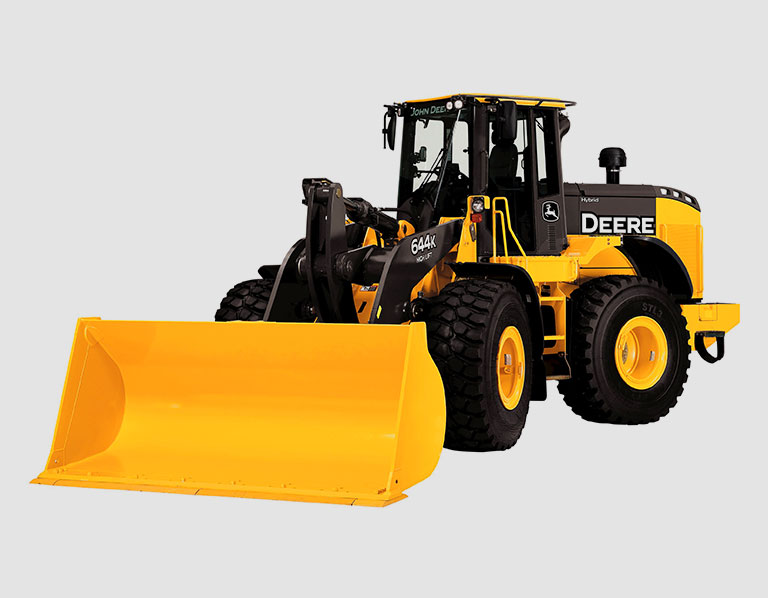John Deere Hybrid Electric Vehicles Benefit from NREL's Wide-Bandgap Thermal Management Expertise

This existing John Deere commercial hybrid loader is similar to the types of vehicles that NREL’s SiC wide-bandgap inverter technology will be used in. Credit: Photo by John Deere
Finding new ways to manage fuel costs of heavy-duty off-highway vehicles can go a long way towards reducing overall operating costs in industries such as construction and mining, which can help contractors and operators remain competitive in the marketplace. This requires equipment that can perform optimally, while minimizing expenses.
Improving the performance of light-duty, electric-drive vehicles with high-power-density, wide-bandgap (WBG) technology is an active area for research and development. John Deere Electronic Solutions (JDES) has partnered with NREL Power Electronics on a WBG project through PowerAmerica, showing that hybrid electric heavy-duty construction vehicles can also benefit from cutting-edge WBG materials and components.
NREL provided JDES with the fundamental thermal management expertise needed for the design of an advanced silicon carbide (SiC) WBG inverter that converts vehicle engine power into electrical power for the motors in a demonstration prototype 644K Hybrid Electric Wheel Loader. Compared with inverters based on a traditional silicon (Si) insulated-gate bipolar transistor (IGBT), the SiC inverter improves the hybrid electric drivetrain performance and enables integration with the engine cooling system.
John Deere's recent demonstration of the new hybrid loader led to it being identified as an exciting and successful project in the PowerAmerica portfolio. "It's exciting to know that our research has contributed to this success for industry, the U.S. Department of Energy [DOE], and the American economy," said NREL Senior Engineer Kevin Bennion.
WBG power electronic components—built utilizing SiC and/or gallium nitride (GaN) devices—outperform current Si-based components by providing the potential for smaller, lighter, more efficient, and potentially higher-operating-temperature components. However, to take advantage of the potential benefits of WBG materials and devices, early-stage research and development is necessary to design high-performance power electronics components (i.e., inverters and converters) that can operate at higher temperatures, voltages, switching frequencies, and power conversion efficiencies while robustly operating within thermal constraints.
For this partnership with JDES, NREL directly contributed to development of the 200 kW 1050 VDC SiC inverter prototype. NREL supported JDES in the thermal management and thermomechanical design of its inverter system to enable the SiC inverter to use the engine radiator fluid to cool the SiC power electronics. Benchtop prototype analysis verified that the SiC inverter results matched predicted performance, and the inverter technology was subsequently applied and demonstrated within the John Deere hybrid loader.
NREL's Power Electronics researchers performed:
- Thermomechanical modeling of critical components
- Thermomechanical stress and displacement analysis related to the cooling system of the power electronics and inverter
- Analysis of the impact of temperature cycling and pressure loading on the thermomechanical behavior of power electronics components
- Computational fluid dynamics (CFD) and heat transfer analysis.
PowerAmerica is a public-private partnership between DOE, NREL, 22 industry representatives, 11 universities, and 2 other national labs. The goal of this collective is to deliver WBG power electronics technologies across myriad applications.
John Deere's improved SiC WBG inverter is an example of technology that has the potential to give heavy-duty vehicle operators a much-needed edge in the marketplace and help keep costs down. NREL's fundamental scientific capabilities and expertise related to thermal management of power electronics WBG technologies are recognized by DOE and industry, as illustrated by NREL's work with JDES and past work with other industry partners.
Learn more about NREL’s sustainable transportation research.
Last Updated May 28, 2025
